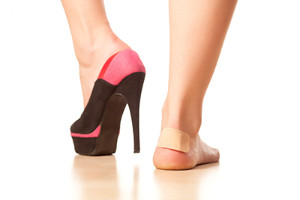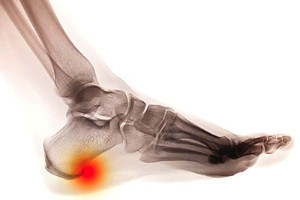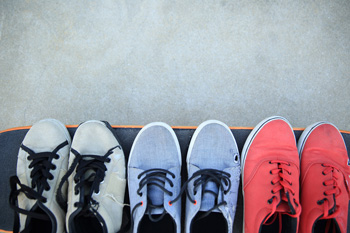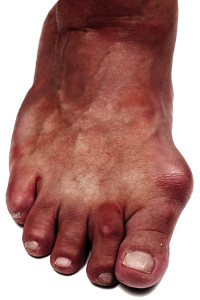Items filtered by date: June 2019
Wearing High Heels Can Cause Possible Foot Damage
 Many women enjoy wearing high heels despite knowing they can be harmful to the feet. There are many uncomfortable conditions that can originate from wearing this type of shoe, including shortened Achilles tendons, and a restriction in circulation. Additionally, the ankles can bend forward, and it may feel like you are standing on tiptoes when high heels are worn. Many people experience bunions and hammertoes from wearing high heels. These ailments can be a result of having inadequate room for the toes to move freely in. Research has shown it is beneficial to alternate between wearing high heels and flat shoes, as this may help to reduce any foot damage that can occur. If you would like additional information about how high heels can harm the feet, please consult with a podiatrist.
Many women enjoy wearing high heels despite knowing they can be harmful to the feet. There are many uncomfortable conditions that can originate from wearing this type of shoe, including shortened Achilles tendons, and a restriction in circulation. Additionally, the ankles can bend forward, and it may feel like you are standing on tiptoes when high heels are worn. Many people experience bunions and hammertoes from wearing high heels. These ailments can be a result of having inadequate room for the toes to move freely in. Research has shown it is beneficial to alternate between wearing high heels and flat shoes, as this may help to reduce any foot damage that can occur. If you would like additional information about how high heels can harm the feet, please consult with a podiatrist.
High heels have a history of causing foot and ankle problems. If you have any concerns about your feet or ankles, contact Dr. Ronald Sheppard from Warren-Watchung Podiatry Center. Our doctor can provide the care you need to keep you pain-free and on your feet.
Effects of High Heels on the Feet
High heels are popular shoes among women because of their many styles and societal appeal. Despite this, high heels can still cause many health problems if worn too frequently.
Which Parts of My Body Will Be Affected by High Heels?
- Ankle Joints
- Achilles Tendon – May shorten and stiffen with prolonged wear
- Balls of the Feet
- Knees – Heels cause the knees to bend constantly, creating stress on them
- Back – They decrease the spine’s ability to absorb shock, which may lead to back pain. The vertebrae of the lower back may compress.
What Kinds of Foot Problems Can Develop from Wearing High Heels?
- Corns
- Calluses
- Hammertoe
- Bunions
- Morton’s Neuroma
- Plantar Fasciitis
How Can I Still Wear High Heels and Maintain Foot Health?
If you want to wear high heeled shoes, make sure that you are not wearing them every day, as this will help prevent long term physical problems. Try wearing thicker heels as opposed to stilettos to distribute weight more evenly across the feet. Always make sure you are wearing the proper shoes for the right occasion, such as sneakers for exercising. If you walk to work, try carrying your heels with you and changing into them once you arrive at work. Adding inserts to your heels can help cushion your feet and absorb shock. Full foot inserts or metatarsal pads are available.
If you have any questions please feel free to contact one of our offices located in Marlboro and Watchung, NJ . We offer the newest diagnostic and treatment technologies for all your foot and ankle needs.
What Can Help Heel Spur Pain?
 A heel spur is a bony growth that forms on the heel of the foot. It consists of a calcium deposit which forms under the heel bone. This condition often produces severe pain and discomfort, and may become worse while putting pressure on the heel. Many patients find mild relief by wearing shoe inserts, as this may be beneficial in reducing impact on the heel. Additionally, it can help to wear shoes that have excess cushioning in the heel area, because this can aid in minimizing inflammation. A proper diagnosis is generally achieved by performing an X-ray of the foot, which can determine the size and location of the heel spur. If you have developed a heel spur, it is advised that you speak to a podiatrist so proper treatment can begin.
A heel spur is a bony growth that forms on the heel of the foot. It consists of a calcium deposit which forms under the heel bone. This condition often produces severe pain and discomfort, and may become worse while putting pressure on the heel. Many patients find mild relief by wearing shoe inserts, as this may be beneficial in reducing impact on the heel. Additionally, it can help to wear shoes that have excess cushioning in the heel area, because this can aid in minimizing inflammation. A proper diagnosis is generally achieved by performing an X-ray of the foot, which can determine the size and location of the heel spur. If you have developed a heel spur, it is advised that you speak to a podiatrist so proper treatment can begin.
Heel spurs can be incredibly painful and sometimes may make you unable to participate in physical activities. To get medical care for your heel spurs, contact Dr. Ronald Sheppard from Warren-Watchung Podiatry Center. Our doctor will do everything possible to treat your condition.
Heels Spurs
Heel spurs are formed by calcium deposits on the back of the foot where the heel is. This can also be caused by small fragments of bone breaking off one section of the foot, attaching onto the back of the foot. Heel spurs can also be bone growth on the back of the foot and may grow in the direction of the arch of the foot.
Older individuals usually suffer from heel spurs and pain sometimes intensifies with age. One of the main condition's spurs are related to is plantar fasciitis.
Pain
The pain associated with spurs is often because of weight placed on the feet. When someone is walking, their entire weight is concentrated on the feet. Bone spurs then have the tendency to affect other bones and tissues around the foot. As the pain continues, the feet will become tender and sensitive over time.
Treatments
There are many ways to treat heel spurs. If one is suffering from heel spurs in conjunction with pain, there are several methods for healing. Medication, surgery, and herbal care are some options.
If you have any questions feel free to contact one of our offices located in Marlboro and Watchung, NJ . We offer the latest in diagnostic and treatment technology to meet your needs.
The Consequences of Wearing the Wrong Size Shoe
Many people tend to wear the wrong size shoe because of convenience or style. However, there are consequences to wearing shoes that do not fit correctly. Primarily, wearing ill-fitting shoes may result in neuropathy. Neuropathy is a condition in which the feet will feel numb. This ailment is painful, and sometimes irreversible. Another side effect of wearing ill-fitting shoes is foot deformities. These may include hammer toes, corns and calluses. Finally, failing to wear the correct size shoe may cause falls and reduced mobility. It is worth it to get the feet professionally measured in order to reduce the risk of these ailments. If you have any questions about shoe size, or if you think you may be experiencing one or more of these side effects, it is advised to speak with a podiatrist.
It is important to find shoes that fit you properly in order to avoid a variety of different foot problems. For more information about treatment, contact Dr. Ronald Sheppard from Warren-Watchung Podiatry Center. Our doctor will treat your foot and ankle needs.
Proper Shoe Fitting
Shoes have many different functions. They cushion our body weight, protect our feet, and allow us to safely play sports. You should always make sure that the shoes you wear fit you properly in order to avoid injuries and deformities such as: bunions, corns, calluses, hammertoes, plantar fasciitis, stress fractures, and more. It is important to note that although a certain pair of shoes might be a great fit for someone else, that doesn’t mean they will be a great fit for you. This is why you should always try on shoes before buying them to make sure they are worth the investment. Typically, shoes need to be replaced ever six months to one year of regular use.
Tips for Proper Shoe Fitting
- Select a shoe that is shaped like your foot
- Don’t buy shoes that fit too tight, expecting them to stretch to fit
- Make sure there is enough space (3/8” to ½”) for your longest toe at the end of each shoe when you are standing up
- Walk in the shoes to make sure they fit and feel right
- Don’t select shoes by the size marked inside the shoe, but by how the shoe fits your foot
The shoes you buy should always feel as good as they look. Shoes that fit properly will last longer, feel better, and improve your way of life each day.
If you have any questions, please feel free to contact one of our offices located in Marlboro and Watchung, NJ . We offer the newest diagnostic and treatment technologies for all your foot care needs.
Heel Pain Can Be Treated!
Possible Causes of Bunions
A bony protrusion on the side of the big toe is referred to as a bunion. It occurs as a result of a misaligned joint in the big toe and will cause the toe to point out. It typically develops gradually and can be caused by wearing shoes that do not fit properly. These types of shoes include high heels, which may provide inadequate room for the toes to move freely in. Additional reasons why bunions develop include medical conditions such as arthritis, flat feet, or bone deformities. Symptoms of this condition consist of swelling, tenderness, and the affected area may feel stiff. Mild relief may be found while wearing wider shoes, and this may help to reduce friction between the bunion and the shoe. If you have a bunion, please consult with a podiatrist who can properly diagnosis and treat this condition.
If you are suffering from bunions, contact Dr. Ronald Sheppard of Warren-Watchung Podiatry Center. Our doctor can provide the care you need to keep you pain-free and on your feet.
What Is a Bunion?
A bunion is formed of swollen tissue or an enlargement of boney growth, usually located at the base joint of the toe that connects to the foot. The swelling occurs due to the bones in the big toe shifting inward, which impacts the other toes of the foot. This causes the area around the base of the big toe to become inflamed and painful.
Why Do Bunions Form?
Genetics – Susceptibility to bunions are often hereditary
Stress on the feet – Poorly fitted and uncomfortable footwear that places stress on feet, such as heels, can worsen existing bunions
How Are Bunions Diagnosed?
Doctors often perform two tests – blood tests and x-rays – when trying to diagnose bunions, especially in the early stages of development. Blood tests help determine if the foot pain is being caused by something else, such as arthritis, while x-rays provide a clear picture of your bone structure to your doctor.
How Are Bunions Treated?
- Refrain from wearing heels or similar shoes that cause discomfort
- Select wider shoes that can provide more comfort and reduce pain
- Anti-inflammatory and pain management drugs
- Orthotics or foot inserts
- Surgery
If you have any questions, please feel free to contact one of our offices located in Marlboro and Watchung, NJ . We offer the newest diagnostic and treatment technologies for all your foot care needs.
Read more about Bunions


